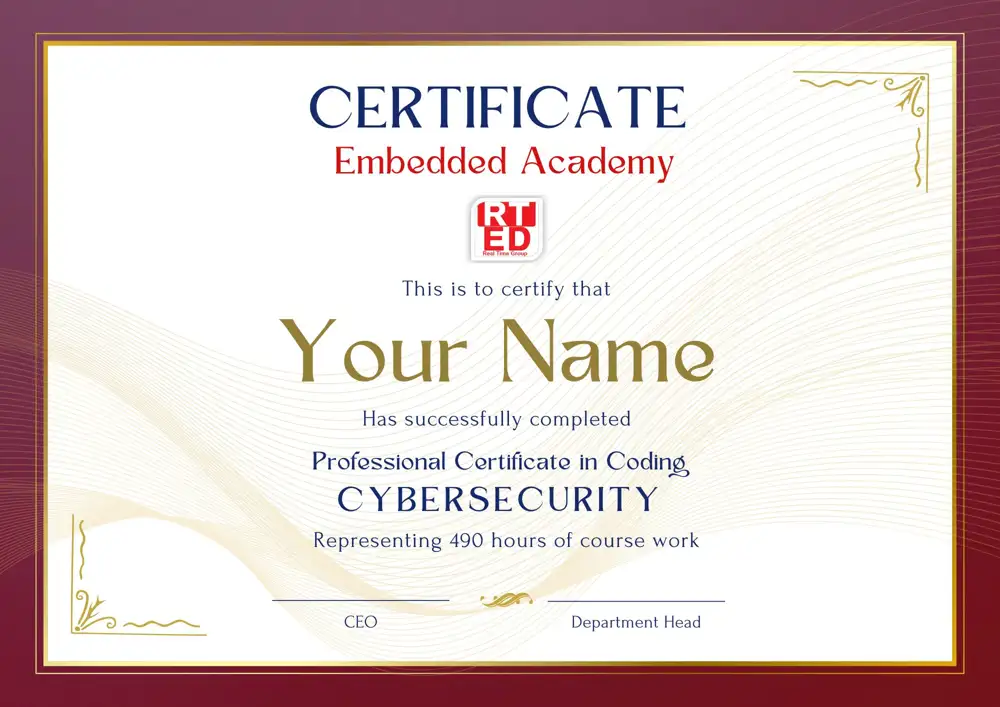
Protect an organization's computer networks and systems from cyber threats.
Annual Salaryclose

During the course, you’ll master in preventing, detecting, and responding to cyber attacks and breaches on organizational information systems. You’ll practice threat detection and defense tactics using IoT (Internet of Things) products, SCADA/ICS (Control and Monitoring) systems, home computing (SOC Analyst with SIEM), and AI tools to optimize processes. To complete the course, you will work on a final project to use as your professional portfolio you can proudly present to employers.
Embedded Academy’s Cyber Security online training also prepares you for the international CEH exam.
You’ll Practice Tools and Techniques Used by Cybersecurity Companies and Intelligence Agencies:
In line with this mission, we have meticulously developed a well-structured study plan that encompasses all the practical, up-to-date, and pertinent knowledge. This plan also strategically allocates ample hours for hands-on practice and coding. Our goal is to provide you with a learning experience that nurtures both understanding and proficiency, ensuring you are well-prepared for the dynamic tech landscape.
Programming Tools and Languages
Skills & Techniques
Upon completing our Cyber Security Course, you'll be well-positioned to integrate into various roles within the rapidly growing field of information security.
These roles span various industries, including finance, healthcare, government, technology, and more. The diverse skill set you gain from our Cyber Security Course makes you a valuable asset to organizations of all sizes, from startups to large enterprises.
Here are some key positions you can pursue:
Protect an organization's computer networks and systems from cyber threats.
Annual SalarySimulate cyberattacks to identify and fix security vulnerabilities.
Annual Salary
Monitor and analyze an organization's security posture in real-time.
Annual Salary
Lead the charge in responding to and mitigating cybersecurity incidents.
Annual SalaryProvide expert advice on security strategies and implementations to various clients.
Annual SalaryAnalyze and reverse-engineer malicious software to improve defenses.
Annual SalaryCyber Security Track: From Novice to Expert
Launch your career in Cyber Security with our most comprehensive educational track. This program is meticulously designed to provide you with an all-encompassing understanding of the field, ensuring you achieve the highest level of expertise.
Key Features:
This track is your gateway to becoming a proficient Cyber Security expert, equipping you with the knowledge, skills, and hands-on experience needed to excel in this rapidly evolving and in-demand area of technology.
| Cyber Modules | Course duration | |
|---|---|---|
| Cyber Security Fundamentals Course | 20 academic hours | |
|
Master core cybersecurity principles, threat landscapes, and essential security practices for protecting digital assets.
| ||
| Cyber Attack Infrastructure Course | 50 academic hours | |
|
Learn attack vectors, exploitation techniques, and infrastructure analysis for effective cyber defense.
| ||
| SOC Analyst with SIEM Course | 50 academic hours | |
|
Master Security Information and Event Management tools and techniques for threat detection and incident response.
| ||
| Malware Analysis Course | 40 academic hours | |
|
Learn to analyze, reverse engineer, and understand malicious software for effective threat mitigation.
| ||
| Forensics Investigation & Incident Response Course | 50 academic hours | |
|
Master digital forensics techniques and incident response procedures for cybersecurity investigations.
| ||
| Penetration Testing (PT) Course | 50 academic hours | |
|
Learn methodologies and tools for ethical hacking and security vulnerability assessment.
| ||
| Software Tools | Course duration | |
| Linux Admin Course | 50 academic hours | |
|
Master Linux system administration, from basic commands to advanced system management, security, and networking.
| ||
| Bash Scripting Course | 25 academic hours | |
|
Learn shell scripting for task automation, system administration, and efficient command-line operations in Linux environments.
| ||
| Python Course | 90 academic hours | |
|
Focusing on Python 3, you’ll learn to program object-oriented, real-industry applications.
| ||
| Networking Course | 40 academic hours | |
|
Master computer networking fundamentals, protocols, and implementation for robust network applications.
| ||
| GIT (Version Control) Course | 25 academic hours | |
|
Learn Git’s core features and workflow, different ways to undo changes or save multiple versions, and collaborate with other teams and developers.
| ||
Tuition
$19,000
$27,970
Cyber Security Specialist Track
Elevate your software development expertise with our focused Cyber Security program. This track is carefully crafted for professionals with prior experience in software and application development, aiming to sharpen your skills in this specialized domain.
Key Features:
This track offers a streamlined path to mastering Cyber Security , ideal for seasoned developers looking to expand their expertise or pivot into this high-demand field. Gain the specific knowledge and skills needed to excel in Cyber Security development and stand out in the competitive tech industry.
| Cyber Modules | Course duration | |
|---|---|---|
| Cyber Security Fundamentals Course | 20 academic hours | |
|
Master core cybersecurity principles, threat landscapes, and essential security practices for protecting digital assets.
| ||
| Cyber Attack Infrastructure Course | 50 academic hours | |
|
Learn attack vectors, exploitation techniques, and infrastructure analysis for effective cyber defense.
| ||
| SOC Analyst with SIEM Course | 50 academic hours | |
|
Master Security Information and Event Management tools and techniques for threat detection and incident response.
| ||
| Malware Analysis Course | 40 academic hours | |
|
Learn to analyze, reverse engineer, and understand malicious software for effective threat mitigation.
| ||
| Forensics Investigation & Incident Response Course | 50 academic hours | |
|
Master digital forensics techniques and incident response procedures for cybersecurity investigations.
| ||
| Penetration Testing (PT) Course | 50 academic hours | |
|
Learn methodologies and tools for ethical hacking and security vulnerability assessment.
| ||
Tuition: $18500.00
Payment Plans
As Low As$330/Month

Benny Cohen
Embedded Academy Founder and CEO
As a long-time veteran in the technology industry, Benny Cohen combines a deep passion for technology with extensive field experience. With a B.Sc. in Electronics Engineering and an M.Sc. in Communication Engineering, he has spent over 20 years developing software and hardware systems, including the last few years focusing on the cybersecurity industry. In addition to his role as the company founder & CEO, Benny also operates as a hands-on practitioner who specializes in penetration testing and has conducted significant security assessments for leading enterprises and security companies worldwide. His approachable teaching style and real-world expertise make learning both engaging and relevant.
As part of the professional experience each graduate undergoes we help in integrating them into the high-tech world through our job search assistance, personalized resume building, and placement in a technology company.
1
Curriculum customization
We'll help you choose and structure the right program most suitable for your needs and career aspirations.
2
Tech Training
Students who start with no prior knowledge of the field will receive the fundamentals required to complete the course.
3
Final Project
Working on your course project and internship with experienced developers.
4
Internship
Get real-world experience adapted to industry standards and requirements with our team of industry-leading engineers.
5
Job Interview
Graduates get resume-building assistance, interview simulations and career guidance.
After completing the Cyber Security program, you will be able to pursue various opportunities in the cybersecurity field. You could explore roles such as Security Analyst, Network Security Engineer, Incident Responder, Penetration Tester, Security Consultant, and more. Companies across different industries, including technology firms, financial institutions, healthcare organizations, government agencies, and cybersecurity firms, are constantly seeking skilled professionals to safeguard their digital assets and data. This training will open doors to a wide range of career paths where your expertise in cybersecurity will be highly valued.
We believe that your success and ours depend on your dedication and commitment to learning! Therefore, the Cyber Security and Information Security courses include homework assignments, exercises, and a final project. Homework assignments will be done individually and privately by the student (if needed, full support will be provided by the instructors and various professionals at Real Time).
The project will demonstrate the knowledge and skills the student gained throughout the course and will encompass all the modules studied, aiming to create practical experience for the student and the opportunity to add this practical experience to the student’s resumes.
All the topics taught will be accompanied by extensive hands-on exercises, including submission of assignments and exams for various subjects. The exercises will cover server penetration, website breaches and defense, and more.
Currently, classes in the Cyber Security program take place online.

